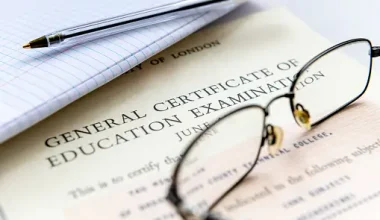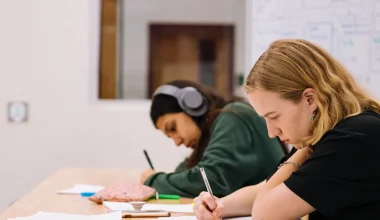If you’re considering a GCSE retake for adults, you’re not alone. Many individuals are discovering the opportunities that reattempting their GCSEs can open up.
GCSEs are arguably one of the most important sets of examinations for teenagers, setting them up for college or sixth form and their A-Levels. This can lead to university and eventually their jobs afterward.
The weight that the exams carry is therefore huge, so GCSEs are a make-or-break point in a student’s life. However, not all students pass or get their expected grades, and from there, the options can seem limited. This is why some students choose to retake their exams.
It is a commendable endeavor for adults to retake GCSEs if they’re looking to pursue higher education, switch careers, or simply boost their confidence. In this article, we’ll explore more than 7 effective ways for adults to successfully retake their GCSEs, helping you take the next step toward your goals.

Table of contents
Can Adults Retake GCSE After They Have Left School?
Adults can indeed retake their GCSEs even after they have left school. The good news is that there are numerous accessible avenues for achieving this goal.
Moving from the workplace or other commitments to the classroom might feel daunting at first, but with the right approach and resources, it’s entirely feasible.
You can always retake GCSE exams, regardless of your age or level of education. If you are on the verge of a grade border, you can also send your papers for a remark. You may get the grade you want.
Additionally, English and math are vital subjects, therefore if you fail them the first time, you must retake them. You must either complete grade four or turn 18 to qualify.
The importance of GCSEs in terms of career and job applications makes it highly advisable to own at least a handful of the credentials. You have a higher chance of landing a role once you complete the retake.
However, this is not the only reason why adults retake GCSE. Let’s find out more.
See also: Can You Retake a GCSE If You Have Already Passed?
Reasons Adults May Have to Retake Their GCSE Exams
We have all been in that situation—16 years old, facing weeks of tests and coursework—during one of the most significant and frequently difficult phases of a young adult’s life. It may be a very trying time for many people, and sadly as a result you might not get the exam grades you need or want.
Even though it may seem like the end of the world at the time, there is still hope! It is never too late to retake these significant exams at a later time in life as an adult, whether it be a year or 30 years from now.
Here are some of the main benefits of retaking your GCSEs:
#1. Better Job Prospects
While having GCSEs is NOT REQUIRED to land a good job, most positions call for English and math grades of C or higher. These are the subjects that are frequently required and are thought to be the most important.
#2. Improved CV
You are probably aware of how challenging it may be to stand out from the competition if you are looking for multiple jobs. When compared to someone who lacks these credentials, you will have a considerably better chance of being considered if you have a few of the essential GCSEs on your resume.
#3. Earning Potential
The increase in your earning potential is maybe one of the most evident advantages of acquiring certain GCSEs. Along with the increased career chances that naturally result from having additional qualifications under your belt, there is more money to be earned.
#4. Opening New Doors
Having those GCSEs can truly be the key to opening up new doors, whether you’re trying to expand your professional options or want to continue your educational pursuits. The road to reaching your life and career goals is a lot simpler and faster if you have these credentials, while it is still extremely possible to find a lucrative job without them.
#5. Further Education
Not everyone needs to attend college or university, but for some, it is a prerequisite for breaking into a specialized field. The requirement for specific qualifications spans a wide range of professions, frequently beginning with GCSEs, from law and medical to engineering and social care.
See also: What Happens If You Fail Your GCSE Exams?
GCSE Entry Requirement for Adults
There are no prerequisites for adults who want to retake a GCSE or begin studying a new subject for the first time.
Moreover, it also makes no difference if you’re a recent graduate who needs to improve your grades to pursue your desired professional route or a retiree searching for a hobby.
No other qualifications are necessary to start studying for GCSEs, so even if you don’t have a ton of other qualifications, this is an excellent place to start if you want to improve your employment possibilities. Additionally, it also doesn’t matter if you possess other qualifications.
However, if you have already taken a GCSE in a particular subject, but aren’t happy with the grade that you got then you can retake your GCSE to improve your grade.
Alternatively, if you wish to study a completely new subject from scratch then you can do this without any prior knowledge or qualifications in the subject.
See also: When Do GCSEs Start And Finish in 2023?
10 Ways To Get GCSEs As an Adult After Leaving School
Certainly, there are a variety of effective ways for adults to obtain/retake GCSE qualifications after leaving school. Moving into adult life doesn’t mean you’ve missed the opportunity to gain these essential credentials. Here are ten accessible methods to consider:
#1. Enroll in Evening Classes
For those considering a GCSE retake for adults, enrolling in evening classes is a practical option. These classes cater specifically to individuals who have left school but want to pursue their education further.
Moreover, evening classes offer a convenient schedule that accommodates work commitments. You can learn subjects you need for your GCSE retake in a structured setting, guided by experienced instructors.
Hence, this approach allows you to balance your daily routine while investing in your education. Therefore, moving back to a classroom setting might feel seamless due to the supportive and adult-focused environment that evening classes provide.
#2. Explore Online Courses
When considering a GCSE retake for adults, exploring online courses is a flexible and convenient avenue.
Online platforms like Coursera, Khan Academy, and FutureLearn offer a variety of subjects tailored to adult learners, allowing you to study at your own pace. These courses provide accessible learning materials, enabling you to grasp concepts without feeling overwhelmed.
With the ability to balance your studies alongside work or other responsibilities, online courses are ideal for those seeking to retake their GCSEs.
Additionally, the interactive nature of these courses promotes engagement and understanding, making your learning journey smoother and more rewarding.
See also: When Should You Start Revising for GCSEs?
#3. Opt for Distance Learning
Opting for distance learning is an excellent choice for adults considering a GCSE retake. Through this approach, you can access study materials and resources remotely, aligning your learning with your schedule.
Distance learning platforms offer subjects relevant to your GCSE, allowing you to study comfortably from home. This method promotes flexibility, enabling you to juggle your studies alongside work and other commitments.
Therefore, with user-friendly interfaces and clear instructions, distance learning simplifies the process of retaking your GCSEs, making education more accessible for adult learners.
See also: GCSE Prep in Year 10: Is Year 10 Important? All You Need to Know
#4. Join Intensive Workshops
For adults embarking on a GCSE retake journey, participating in intensive workshops can be highly effective. These workshops focus on core subjects, immersing you in concentrated learning sessions. They are tailored to adults seeking to enhance their education and skills.
Through hands-on activities and interactive sessions, intensive workshops facilitate quick comprehension of essential concepts. This approach ensures that your GCSE retakes for adults are both efficient and engaging, providing a targeted way to refresh your knowledge and improve your exam readiness.
#5. Use Revision Guides
Utilizing revision guides is another practical strategy. These guides provide concise explanations and examples, helping simplify complex topics.
Designed with clarity in mind, revision guides make studying more manageable, enhancing understanding without unnecessary complexity. With step-by-step instructions and practice exercises, they enable adult learners to grasp key concepts efficiently.
These guides therefore serve as handy companions throughout your GCSE retake journey, offering straightforward explanations that bolster your confidence and aid in effective exam preparation.
See also: Last-Minute GCSE Revision Tips| Score Higher In Last-Minute
#6. Seek Personal Tutors
In the pursuit of a GCSE retake for adults, seeking personal tutors can be a highly beneficial approach. These tutors offer tailored guidance, adapting to your learning pace and needs. With one-on-one attention, you can clarify doubts and focus on specific subject areas that require improvement.
Additionally, personal tutors provide straightforward explanations and exercises, making challenging concepts more comprehensible. Through their expertise, you gain a customized learning experience that maximizes your chances of success in your GCSE retake journey.
If you want to take French GCSE, read about How to Find the Perfect French GCSE Tutor in 2023.
#7. Practice with Mock Exams
When adults are considering a GCSE retake, practicing with mock exams is a crucial strategy. Mock exams simulate real test conditions, helping you become familiar with the exam format and time constraints. Through these practice tests, you can identify areas of improvement, allowing for focused study.
Mock exams also help in managing exam-related stress and enhancing time management skills. By regularly engaging in mock exams during your GCSE retake journey, you increase your confidence and readiness for the actual assessments.
See also: What Are GCSE Mock Exams? Your Ultimate Guide for GCSE and A-Level
#8. Utilize Educational Apps
For adults pursuing a GCSE retake, leveraging educational apps proves advantageous. These apps offer interactive learning experiences, making complex subjects more approachable. Through engaging content and user-friendly interfaces, educational apps cater to different learning styles.
With the flexibility to study anywhere and anytime, these apps align perfectly with the schedules of busy adults. Whether you’re revisiting a specific topic or exploring new subjects, educational apps provide bite-sized lessons that simplify learning during your GCSE retake journey.
See also: Top 15 Websites for GCSE Revision in 2023 with Answers
#9. Form Study Groups
Collaborating with peers provides diverse insights and clarifications on challenging topics. By engaging in discussions and sharing perspectives, you deepen your understanding of subjects.
Study groups encourage active learning, making the learning process dynamic and engaging. Together, you can tackle complex concepts and motivate one another during your GCSE retake journey.
See also: The Night Before a GCSE Exam: A Survival Guide in 2023
#10. Consider Apprenticeships
When adults are contemplating a GCSE retake, considering apprenticeships is a strategic move. Certain apprenticeship programs require GCSE qualifications, making retakes essential for eligibility. These programs offer on-the-job training while you work towards obtaining your GCSEs.
Engaging in an apprenticeship combines practical experience with educational advancement, enhancing your skills and employability. By retaking your GCSEs, you open doors to apprenticeship opportunities that align with your career aspirations, ensuring a comprehensive growth trajectory.
See also: How Many GCSEs Do You Have To Take? 2023 GCSE Q&A
FAQs
GCSEs for adult learners are courses designed for applicants aged 19 years or over who do not already have a full UK Level 2 Qualification (of 5 or more GCSEs at Grade 4/C or above) and wish to obtain this to progress on to further study.
GCSEs are the main qualification taken by 14 to 16-year-olds, but are available to anyone of any age.
It can seem like the end of the world to miss the mark on such important exams, given that they can determine whether or not you can go to college or university, however, this isn’t entirely true. To answer in short: Can you get into college with no GCSEs? Yes, you can.
Conclusion
Pursuing GCSE retakes as adults is a commendable step toward enriching their personal and professional lives.
However, the variety of options available, from flexible courses to self-study techniques, empowers them to succeed.
By dedicating time, effort, and perseverance, you can achieve your goal of obtaining GCSE qualifications, opening doors to a brighter future.
References
- Thinkstudent.co.uk – 3+ Ways To Get GCSEs After Leaving School (for Adults)
- Onlinelearningcollege.com – Getting GCSEs After Finishing School






